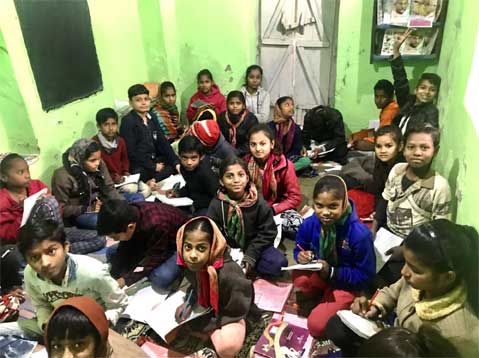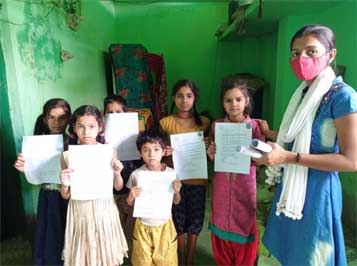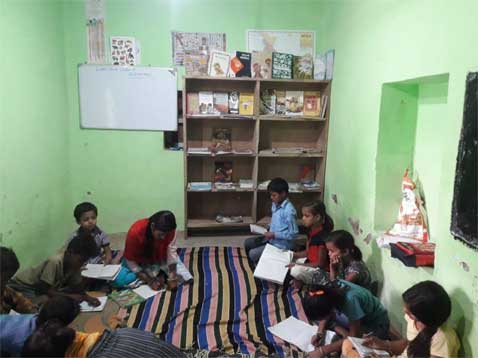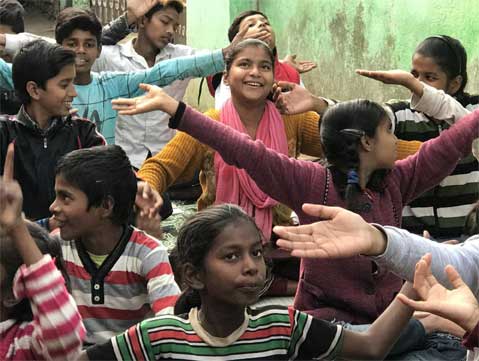Ananya Pathak
If there is something common to the ideas of all great educationists and educational philosophers of the world, it is that when one decides to take up teaching as one’s calling in life, it demands that the person commit himself/herself to a lifelong journey of learning and growing. To be a real teacher one must not stagnate in one’s own growth by thinking that one already has access to all knowledge, one should be humble and grounded and look at the pupil as a co-traveller in the journey of learning, which should be mutual rather than one-sided. Perhaps the thing that is most beautiful about being a teacher is that one gets the opportunity to work with beating hearts and thinking minds rather than inanimate objects.
Beyond the classroom: life becomes the landscape
The fact that you are working with ‘people’ and not ‘things’ adds so much more value to what you are doing and also simultaneously holds you more accountable. Can you then afford to stop learning and growing? The decision to be in the vocation demands an unprecedented commitment to learning every day, life itself has to become a laboratory with its experiences turning into mentors and hardships, life lessons.

Students and teachers both come from the social world, the school doesn’t operate in another reality, it is very much a part of the social. The home of the child, his/her social and economic moorings, cultural practices and value systems, preferences and choices all shape the learner’s mind, how then is it possible for the pedagogue to remain a distant, aloof and indifferent ‘knowledge-provider’ and still be effective?
A child whose father is an alcoholic, who beats up her mother who has worked hard all day at the nearby construction site or a child who works in the fields with his parents after school hours cannot understand ideas such as the rise of the feminist movement in the world or the concept of child labour and why the Indian Constitution has abolished it.
How do you teach a child whose father was butchered in a communal riot that India is a secular country and all communities have the right to co-exist or how do you teach a group of Dalit girls in the local village school that untouchability and caste oppression have been abolished by the constitution of their country, when in their own school they are forced to drink water from an isolated mud pot when their upper caste counterparts drink from a clean well, when they are made to clean the school compound, dispose of the excreta from the school toilets but their upper-caste counterparts are treated with dignity and only expected to concentrate on their academics?
What would be the meaning of being a teacher who only sees herself as a subject-expert and seldom connects with the life-world of the student, who looks at her work as solely that of a knowledge-provider rather than as a friend, guide and a mutual traveller in the journey of learning?
Surely we can all recall from our own educational journeys that the teachers who leave a lasting impact on our lives, are not necessarily those who taught a subject well, but those who touched our lives beyond their expertise–relating with our worlds outside school, our emotional selves, the innermost corners of our being with their positivity and guidance.
Why lose the opportunity to be the light in the learner’s life?

The COVID-19 pandemic and all other forms of collective and personal crisis have once again underlined for us the need to rethink and redefine the vocation of teaching beyond subject expertise, beyond the confines of the syllabus and the classroom, beyond examinations and evaluation.
Our students are undergoing so much already as the world faces an unprecedented crisis. Under the circumstances, can we remain only knowledge-providers, distant professionals whose only task is to ready learners for a good academic performance? No, our work as teachers right now is much more important, we have to work as healers, friends and guides touching and positively impacting the lives of learners by relating to them, patiently listening to their pain and trauma, helping them the best we can.
We are after all in a vocation of the soul, heart and mind. We hold the power to be a healing touch and guiding light. We are fortunate to be in this vocation. Let’s make the most of it.
Shiksha Swaraj: touching lives

Shiksha Swaraj is a library and resource centre that was started in a remote village in Bihar last year before the pandemic made its presence felt. What started off as a small reading club for village children from the Dalit and Maha Dalit communities with around 20 kids gradually changed into a thriving learning community with over a hundred children from the neighbourhood who showed immense interest in the reading program and storytelling sessions that enlivened their evenings. We decided to expand the reading and literacy initiatives for our first generation learners, most of whose parents either worked in agricultural fields or in nearby factories and brick kilns, and include activities to build an academic support structure for the kids so that they could learn mathematics, science and english, pick up the basics of computers, develop physical fitness through sports and games, learn theatre, painting and poetry recitation. We wanted to help the children and their parents understand that education was important and it was through education or Shiksha alone that they would become self-reliant or gain Swaraj.
True to its name, Shiksha Swaraj has become a sacred haven for the learners who enjoy the sessions that they experience with our dynamic teachers and volunteers who make sure to teach in a method that is child-centric, dialogic and egalitarian.
The spread of the pandemic did hamper our activities but our team of volunteers travels from home to home handing out worksheets and learning materials to make sure that the children practice at home.

We also make sure that we communicate over the phone with each of our students and their parents to make sure that everything is fine with them. The efforts of Shiksha Swaraj have also been towards ensuring that none of the students go hungry amid the pandemic and from collecting funds for distribution of grains to ensuring that each home priorities the education of their children, our efforts have been to become one with the social reality of the child, to step into the lived experiences of the learner.
The work has surely been challenging but worth it, especially when a mother comes and tells you that she has cancelled the wedding of her teenage daughter because she is now convinced that she ought to study or when a labourer’s son stands up confidently before a room full of adults to tell them that he wants to change his parents’ fate and grow up to become a human rights activist and serve the oppressed castes.
The children that Shiksha Swaraj is working with neither have access to smartphones nor do they hope to return to village school they used to attend after the pandemic owing to growing financial stress on their families. We know that we are operating in an exceedingly difficult terrain but we know that our role as teachers is much more than disseminating subject based information in the classroom, its much more than ensuring that they know the facts- our work is to reach out to them in these moments of crisis and touch their beings.
Children are going through so many hardships, from being under the pressure of domestic work and the responsibility of looking after younger siblings to working in the fields to support the family income, from coping with abusive family members to struggling for even one nutritious and filling meal a day. Our work demands that we strike a balance between ensuring that they continue to learn even as the pandemic begins to peak again and extend emotional support so that they don’t feel left out.
Our attempts in these difficult days have all been towards making sure that the Shiksha Swaraj learning community becomes the sacred haven that children can always feel assured about, a place of unconditional love and comfort that is centred on the child, democratic learning and a life-long commitment to the vocation of teaching.
The author is Associate Editor, The New Leam. She is also the Co-founder of Shiksha Swaraj, a library and resource centre for children from the marginalized communities in Bihar’s Madhopur village. She can be reached at ananyapathaak@gmail.com.
